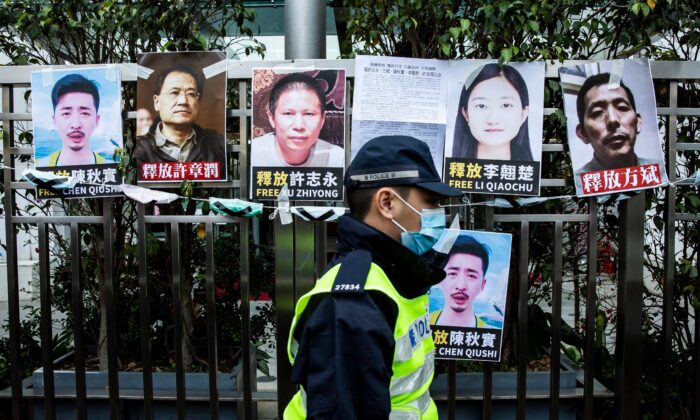Xu Zhiyong, a law scholar who urged Xi Jinping to step down, has been on hunger strike since Oct. 4, demanding to be free from ill-treatment.
U.S. officials and activists are calling on China’s communist regime to release a Chinese legal activist whose health is deteriorating after nearly a month-long hunger strike over inhumane prison conditions.
“We are disturbed by reports that civil rights activist Xu Zhiyong is on a hunger strike in protest of inhumane treatment in prison,” the U.S. Ambassador to China Nicholas Burns said in a
statement posted on social media X on Oct. 28.
“We urge the PRC to release Mr. Xu and, in the interim, to treat him, and all prisoners, with dignity in accordance with [United Nations’] member state obligations,” Burns said, using the acronym of the regime’s official name, the People’s Republic of China.
Xu, a rights advocate and law scholar, was given a 14-year jail term by a Chinese court in April 2023 in a case that shed light on Beijing’s
repression of human rights lawyers and sparked
global condemnation.
Xu was
convicted of “subverting state power,” a charge linked to his role in the New Citizens’ Movement, a grassroots initiative that advocates for civic rights and demands the Chinese Communist Party (CCP) elites disclose their wealth. Authorities commonly use the “subverting state power” charge to target and imprison dissidents.
Xu has been jailed since February 2020 after participating in a private meeting with members of the New Citizens’ Movement and other rights advocates in Xiamen, a city on China’s southern coast.
U.S. officials and activists recently voiced concerns about Xu’s health, noting that Xu has been on a hunger strike since Oct. 4, demanding to be free from isolation and other ill-treatment.
The mistreatment Xu has been subjected to included “torture, solitary confinement, and forced labor,” according to Rep. Chris Smith (R-N.J.) and Sen. Jeff Merkley (D-Ore.), chair and co-chair of the Congressional-Executive Commission on China, respectively, who issued a
statement on Oct. 24 calling for Xu’s immediate release.
PEN America, who
gave Xu its 2020 PEN/Barbey Freedom to Write Award, expressed concerns about the dissident’s ability to communicate with his family and his health condition.
“Prison authorities continue to deny Xu communication with family and even access to reading and writing materials,” said Liesl Gerntholtz, managing director of the PEN/Barbey Freedom to Write Center, in a
statement issued on Oct. 24, adding that the organization is “particularly concerned about the critical condition of Xu’s health” after weeks of hunger strike.
Once a law lecturer at a university in Beijing, Xu attracted the attention of the CCP in the
early 2000s when he provided legal assistance to migrant workers, petitioners, and others whose rights were abused by the authorities. He also penned articles to publicly criticize CCP officials, champion fair access to education, and advocate for a peaceful transition to constitutionalism in China.
As a result of Xu’s activism, he served a
four-year prison sentence from 2013 to 2017 on the charge of “gathering a crowd to disturb public order.”
In late 2019, Xu went into hiding following news of several arrests connected to the meeting in Xiamen. Despite the risks, he continued to use his articles to decry the Chinese regime’s intensified control over society.
Just days before his arrest in February 2020, Xu released an open letter calling on CCP leader Xi Jinping to step down. In the letter, he accused Xi of stifling freedom in Hong Kong and
covering up the COVID-19 pandemic.“You didn’t authorize the release of information about the actual situation, which allowed the outbreak to spread explosively and now become a nationwide disaster,” Xu wrote. “I don’t think you’re an evil person; rather, you simply lack wisdom.”
Several members of the New Citizens’ Movement remain incarcerated in China, including co-founder Ding Jiaxi, who was handed
a 12-year sentence by a court in Shandong Province in April 2023, alongside Xu.
Reporters Without Borders (RSF) urged the international community to step up pressure for the release of Xu and other detained rights advocates.
“Political commentator Xu Zhiyong, was only serving the public interest by commenting on the political situation and should never be arrested, not to mention tortured and sentenced to such a harsh prison term,” Cédric Alviani, director of the RSF’s East Asia Bureau, said in a
statement at the time.
“We call on the international community to step up its pressure on the Chinese regime so they release Xu as well as all 114 detained journalists and press freedom defenders.”





